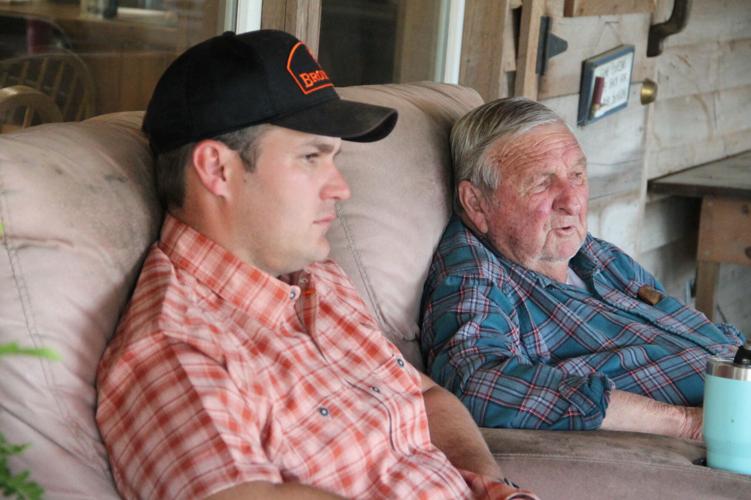
Williamsburg HomeTown Chamber Farmer of the Year, William Johnson of Thorntree Farms.
William Johnson’s big Suburban bumps along the gray dirt road winding through his farm at 7161 US 521 in Salters. He points out the two Tennessee Walker horses grazing in one pasture, a handful of Irish Dexter cows in the field, and Kune Kune pigs in their pen. One is due with piglets any day now.

Kune Kune and Mangalitsa pigs.

William, Carla, Hallie and Eva Johnson at Thorntree Farms. William Johnson is the Williamsburg HomeTown Chamber Farmer of the Year.

William Johnson examines the dirt for earthworms, a good sign of healthy soil.
Under one of the farm sheds, there is a white container foaming over with a grayish bubbly sludge. Johnson calls it a microbial mineral tea. He says it’s made of aerobic microorganisms, primarily fungi and protozoa. He’s going to spray the concoction on his fields to help improve the fungi population of the soil.
“Most farmer fields are bacteria dominated. My farming practice is a biological approach and systems approach. I’m more of a root cause than a fix-it farmer,” he says.
Johnson is this year’s Williamsburg HomeTown Chamber Farmer of the Year, an award that came as a complete surprise to the young farmer, but not to the people who know him.
His farm, Thorntree Farms, is not a big established commercial endeavor. He grows small crops of Jimmy Red corn, Naked and Black Cosaque oats, and three varieties of wheat — Turkey Red Wheat, Appalachian White and Georgia Gore.

Little hands wait for fresh sour dough bread.
This season he is also planting a small field of soft red wheat, a more delicate flour, so his wife, Carla, can use it to make biscuits. She’s excited to use it to make pies and pastries. The family has a small mockmill at their home they use to grind the harder wheats they currently grow to make bread. Johnson’s sour dough starter is stored in a large Mason jar in the refrigerator. He has the feeding method down to an art, and makes sure the family always has fresh bread.

Cows on the farm.
Carla keeps the refrigerator stocked with fresh milk from their cow, Pearl. She is learning to make yogurt for their two daughters, Hallie, 4 years old, and Eva, who is two. The couple also have a son on the way.
Carla didn’t grow up on a farm, but the life suits her. She is trained as a registered nurse, but now stays home with her girls, raises chickens and helps tend to the animals. She shows off her multicolored eggs, the color of designer farmhouse paint samples: dark taupe, milk chocolate brown, creamy peach.

Hallie Johnson picks Sour Weed to chew on from the fields at Thorntree Farms.
Johnson’s fields are currently full of flowering turnips, crimson and clover. Sweet corn is coming up in the front field by the road. There are usually strawberries, but picking them isn’t easy work. The family is taking the year off. They also grow watermelon in the summer.

William Johnson and his grandfather, Graham Britton talk on the porch.

Hallie Johnson shows her field flowers to her grandfather, Graham Britton.
There are only around 80 tillable acres on the 400-acre farm now, says Johnson. Tobacco, cotton and corn used to cover much of the original 2,000 acres. Johnson’s grandfather, Graham Britton grew up on this land. Back then he plowed the fields behind a mule.
Johnson speaks fondly of the childhood weekends and summers he spent at the farm. After he graduated St. Johns Christian Academy in Monks Corner, he went to Clemson University and earned a Mechanical Engineering degree. He worked at SC Electric and Gas as a distribution design engineer, then worked at Santee Cooper Power Plant in engineering. Last October he left his job to farm full-time.

Jimmy Red Corn.
“Because we weren’t already an established large farm, we had to find a niche market. It was not like the farm business was inherited, I had to build it up,” says Johnson.
One of his buyers is award winning heirloom grain distributor, Anson Mills. The owner, Glenn Roberts, encouraged Johnson to go the organic route.
“A southerner like me is hesitant to go organic, but when you mess with those chemicals, when you spray a field and see a plant die before you’ve even left the field, I didn’t want my kids eating those chemicals,” he says.
Johnson says he wanted to move away from main stream agriculture, and dig into what it takes to grow a good crop from a health prospective without herbicides, fungicides and insecticides. He has shifted focus to landgrown seeds, which are sourced on the property after the growing season. They can adapt to the land and produce a more stable crop. He says the hard work is evident in the results.
“You make a more nutritious grain that actually tastes better. It has a better nutrition profile, and that translates into aroma and flavor. Just like our strawberries.” The farm has a shed by the road where the family occasionally sells seasonal produce. “For the last two years we sold strawberries, and when you walked out there you could smell strawberries. You can’t smell that in the grocery store,” says Johnson.
There have been some growing pains during the process. When he first transitioned to managing the fields, his grandfather was planting mostly deer corn. “I had to do some stuff some ways that didn’t work,” Johnson says.
His grandfather agrees, but is thankful William wanted to take over. “In order for land to stay in a family this long, someone has to pick it up. You don’t get rich farming, so you have to love it,” says Britton.

Planting beans — a view from the tractor.

Soybean crop.
Johnson’s daughter, Hallie, walks along picking Sour Weed from the field. He hopes she’ll be the 8th generation to grow up on this land
Johnson has also been farming 300 acres at Oaklyn Plantation in Darlington since 2023. It is a certified organic farm where he grows soybeans, Turkey Red wheat and rye. They were looking for someone to farm the land organically and Johnson decided to take on the project. “I’m just cutting my teeth there,” he says.

JOhnson preps a certified organic field for the first planting in two decades. Photo by William Johnson.
Roberts, of Anson Mills, says he saw Johnson seamlessly take on the Oaklyn Plantation project. “He is intuitive about what he is doing. William is an engineer, and under all that countryality he brings the same thing engineers bring to a project.”
Roberts says a storm came through last September and blew down corn crops all across the area. Johnson was the only one who realized the crop wasn’t lost. He immediately called out a crew and harvested the corn by hand.
“As farmers we have to remember how to get around and not through things. William grew up in it. He honors history but knows how to adapt. He is one hell of a brain trust. He is good for South Carolina, good for the neighborhood, and good for his country,” says Roberts.
The next step for Johnson is to work on a good processing system to get the harvest to wholesale buyers. Aside from Anson Mills, he also supplies Altman Farm and Mill with wheat and corn. His product can be found in processed grain and mixes sold retail by both companies.
Though Johnson isn’t quite sure why he won Farmer of the Year, it is evident he is representative of a new farming generation, the bridge between traditional farming and a new way of business.



















